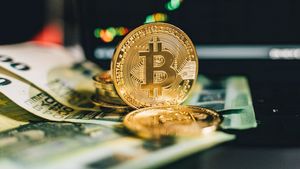JAKARTA - Bitcoin, a digital currency created by Satoshi Nakamoto, has sparked heated debate among the crypto community. Some see Bitcoin as a future currency that provides financial freedom and technological innovation. Some consider Bitcoin as a Ponzi scheme that tricks investors with the lure of fake promises.
One of the figures who criticized Bitcoin was Owen Benjamin, a comedian and conspiracy theorist. In a video, he calls Bitcoin a "decentralized Ponzi scheme" that has no real value. He said that Bitcoin has no creator to account for, cannot be used as a valid tender, and only relies on volatile demand and offers.
He also compared Bitcoin with other assets such as gold, silver, and soil, which according to him have intrinsic value and are more suitable as a store of value. He argues that people don't want to spend Bitcoin because they hope the price will continue to rise.
Against Crypto Figures
Benjamin's views are opposed by several crypto figures, such as David Schwartz, CTO Ripple, and Saifedean Ammous, authors of The Bitcoin Standard. They defend Bitcoin as a decentralized currency that has advantages over fiat currencies that are easily eroded by inflation.
SEE ALSO:
Schwartz challenged Benjamin by asking about the psychological impact of the currency which continues to decline in value on consumer behavior. He asked if people really want to sell their belongings with currencies that are expected to lose their value. He also emphasized that Bitcoin has value because people believe in him and are willing to exchange it for other goods and services.
Amous also pointed out that Bitcoin is rare which makes it a better store of value compared to fiat currencies that central banks can print unboundedly. He argues that the success of the dollar even though inflation shows that people are willing to use currencies with decreasing values. However, that doesn't mean that they won't switch to a better currency if given a choice.
This debate does not only occur among crypto users, but also among policymakers and regulators. In May, the Governor of the Central Bank of Ireland, Gabriel Makhlouf, called Bitcoin and other cryptocurrencies a "Ponzi scheme", raising suspicions. He also mentioned the possibility of regulatory action against the influence of cryptocurrencies promoting digital assets without revealing their financial interests.
On the other hand, several countries have taken steps to recognize and regulate Bitcoin and other cryptocurrencies. For example, El Salvador has made Bitcoin a legal currency in its country, while Switzerland has granted operating permits to several crypto companies. In addition, several global financial institutions, such as PayPal, Visa, and Mastercard, have also started dredging crypto transactions on their platforms.
The English, Chinese, Japanese, Arabic, and French versions are automatically generated by the AI. So there may still be inaccuracies in translating, please always see Indonesian as our main language. (system supported by DigitalSiber.id)
















